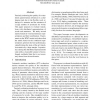Free Online Productivity Tools
i2Speak
i2Symbol
i2OCR
iTex2Img
iWeb2Print
iWeb2Shot
i2Type
iPdf2Split
iPdf2Merge
i2Bopomofo
i2Arabic
i2Style
i2Image
i2PDF
iLatex2Rtf
Sci2ools
ACL
2015
2015
Representation Based Translation Evaluation Metrics
Precisely evaluating the quality of a translation against human references is a challenging task due to the flexible word ordering of a sentence and the existence of a large number of synonyms for words. This paper proposes to evaluate translations with distributed representations of words and sentences. We study several metrics based on word and sentence representations and their combination. Experiments on the WMT metric task shows that the metric based on the combined representations achieves the best performance, outperforming the state-of-the-art translation metrics by a large margin. In particular, training the distributed representations only needs a reasonable amount of monolingual, unlabeled data that is not necessary drawn from the test domain.
Related Content
| Added | 13 Apr 2016 |
| Updated | 13 Apr 2016 |
| Type | Journal |
| Year | 2015 |
| Where | ACL |
| Authors | Boxing Chen, Hongyu Guo |
Comments (0)

